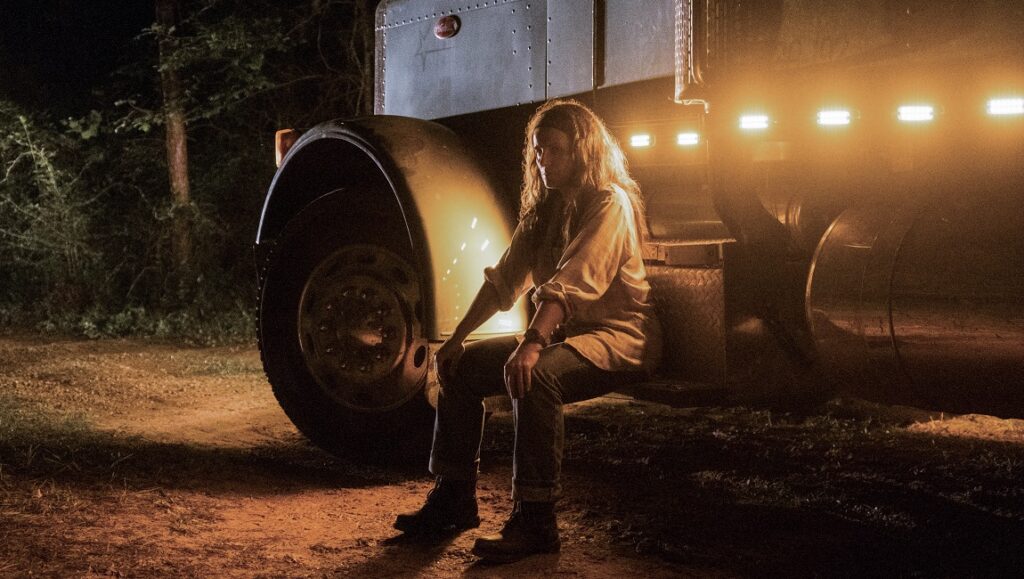There are pockets of interest to be found in Paradise Highway, but its mediocre mashup of genre and weak character work ensure that it never rises above a middle-of-the-road debut.
No one would mistake the surprisingly deep list of trucker films out there for anything approaching high art. So the opportunity to watch acting great Juliette Binoche let down her hair and rough it on the road is a peculiarly intriguing hook. Binoche stars in Norwegian director Anna Gutto’s new film Paradise Highway, Gutto’s theatrical debut following a slate of shorts and some co-directing duties on the Netflix TV series Home for Christmas. Gutto herself is a multi-hyphenate creative, acting as well as composing plays, essays, and translations, showcasing a cerebral fascination with boundaries of adaptation and expression. Paradise Highway’s subtly contemplative storytelling derives its strengths from the director’s considered vision. Yet, as with many a debut, the film’s underdeveloped components don’t align well enough to properly realize its thematic ambitions.
Sally (Binoche), a hardened itinerant truck driver, visits her incarcerated brother, Dennis (Frank Grillo), days before his release. Their warm reunion is cut short when he passes her a slip of paper indicating a rendezvous point where she will pick up an illicit package. Dennis, in deep with some nefarious players, has been relying on his sister to traffic goods to save his own skin. When Sally arrives at the meet, she’s disturbed to learn that her last job will be delivering a child, Leila (Hala Finley), to a shady customer in Tennessee. The exchange doesn’t go as planned, and Sally is forced to lam it with Leila as some federal agents (Morgan Freeman and Cameron Monaghan) get wind of the illegal dealings.
Binoche does her best with the relatively pedestrian material, infusing Sally’s rural Hollywood homeliness with a core dignity and veteran charm. They offset some of the characterization’s weaker elements, chief among them its cliched, broad-strokes rendering of a woman on the road. The character, with her few backstory details, lacks the texture needed to be truly captivating, remaining moderately engaging only due to it being Binoche breathing life into the role. Her accent has a way of undermining the viewer’s suspension of disbelief (the film lampshades this by referencing Sally’s Canadian origins within the first few minutes). Finley as Leila, meanwhile, is one of the film’s highlights, her ability to convey a range of feelings key to sustaining Paradise Highway’s emotional center. She does struggle with some line deliveries, though this issue isn’t exclusive to her, but the occasional off-key line really can deflate the impact of a moment. Freeman plays his maverick retired fed Gerick like a saucy grandpa with just enough skepticism toward the system to be likable. And, as mentioned, Grillo is also here, effectively playing a Grillo stock character.
Gutto certainly mines from the aesthetic conventions of other trucker films, inserting some pulpy, B-movie crime thriller beats into the larger dose of down-home, red-blooded Americana. But the overall feeling of the film is ultimately undefined, a result of its mediocre mashup of genres. It’s a crime film suffering from underwhelming action set pieces and uninspired procedural beats. It’s a by-the-numbers road movie, predictable for any viewer with elementary knowledge of the template. It’s an indie drama characterized more by its low-budget look than any narrative inventiveness. The periodically clunky dialogue does the bulk of the character work. The stock music neutralizes any of the soundtrack’s power.
Points for Gutto’s attempt to round her film out into something of a message picture, though. She’s stated that she was inspired to tell a story about our unnerving proximity to human trafficking (Gerick highlights a statistic about most abducted children being held captive a few miles from their homes at one point) and the toughness an isolated life breeds. Little nods to numerous topics — the inefficiencies and biases of law enforcement bureaucracy, the haunting legacies of abuse, the corrupting capacity of capital — appear every now and again to add some meat to the bone. The more conspicuous ideas of feminine resilience and the liberating potential of feminist collective action function weakly as organizing principles; rather, they supply a grace note to wrap up the film’s action. A solid enough outing for a first feature, Paradise Highway ultimately fails to establish itself as anything more than middle of the road.


Comments are closed.